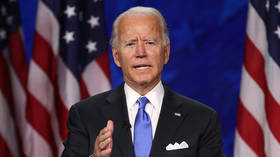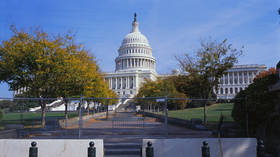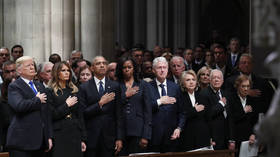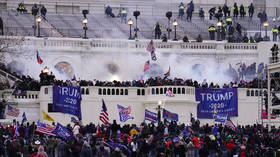‘Worse than the Civil War’: how fixation on Capitol riot makes America ignore its other major problem
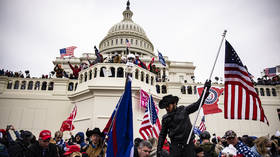
One year after the US Capitol riot, Washington seems worried about domestic terrorism only when conservatives are perpetrators, but polling suggests no one outside the establishment echo chamber is swayed by the skewed narrative.
As a GOP congressman held up nearly identical photos of federal buildings being breached – one of the US Capitol last January and another of the Department of the Interior in October – Attorney General Merrick Garland sat stone-faced.
Try as he might to provoke the nation’s top law enforcement official to characterize leftist protesters who fought their way into the Department of the Interior (DOI), Representative Greg Steube (R-Florida) couldn’t goad Garland into offering an opinion. While Garland has called the Capitol riot “the most dangerous threat to democracy” seen in his 44-year legal career, the attorney general said he couldn’t make any determinations about what happened at the DOI.
What Garland said next at the House Judiciary Committee hearing on October 21 stunned Steube. When asked if he believed the DOI rioters, like the Capitol rioters, were domestic terrorists, Garland replied, “I’m not going to be able to reference that specific incident since this is the first I know about it.”
The riot in question involved the storming of a restricted federal government building just about a 30-minute walk from Garland’s office and just one week before the committee hearing. Environmental extremists injured multiple security officers, including at least one who was hospitalized, and 55 were arrested.
If Garland seemed suddenly unconcerned about attacks on federal buildings in Washington, he wasn’t alone. The Washington Post referred to the violent breaching at the DOI as “clashes” between protesters and officers. Other media outlets referred to the rioters as “occupying” the building and being arrested after a “sit-in.”
There was no hyping of the incident like that done over the Capitol riot, which media and political pundits have likened to the September 11, 2001 terrorist attacks. Some, such as political strategist Matthew Dowd, have called it “worse” than 9/11. Huffington Post White House correspondent S.V. Date said it was “1,000 times worse,” at least partly because it was led by then-President Donald Trump. Family members of 9/11 victims were outraged by such rhetoric.
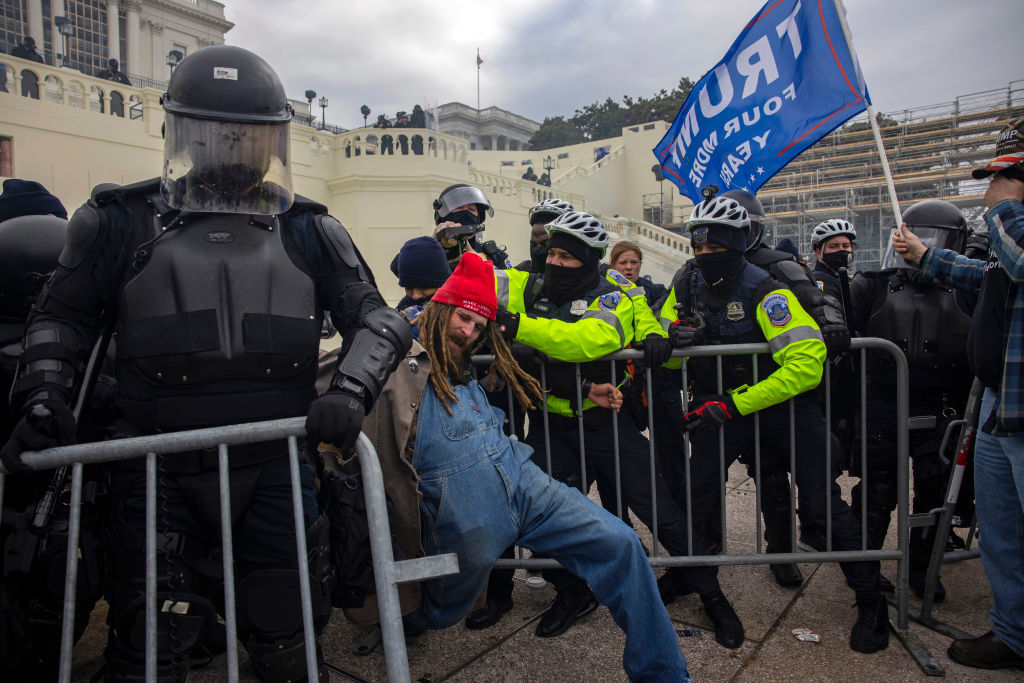
President Joe Biden – whose victory over Trump was challenged by the election-fraud protestors who breached the Capitol – went so far as to call the riot the “worst attack on our democracy since the Civil War.” Apparently fond of such hyperbole, he later called laws passed by several Republican-controlled states to deter election fraud “the most significant test of our democracy since the Civil War.” He went on to weave the riot and the new state legislation together, suggesting they were rooted in the same ideology.
Such statements might seem outlandish, but the narrative fed a theme: branding opposition to the ruling party as domestic terrorism – in fact, the only real domestic terrorism – and portraying the threats posed by American right-wingers as even worse than overseas terrorists. And a threat that big obviously required a harsh crackdown.
Despite the fact that no one was killed by the Capitol rioters, contrary to false media reports, they’ve been portrayed as racist and bloodthirsty insurrectionists. US Representative Hank Johnson, the Georgia Democrat who once theorized that an expansion of US military operations in Guam might cause the island to capsize, argued that lawmakers would have been murdered if a Capitol police officer hadn’t fatally shot one of the rioters (the only person who was killed that day). “I have no doubt that some of us who look like me would have been hanging from the railings . . . swinging like fruit, strange fruit,” said Johnson, who is black.
Reporters reacted similarly. In fact, six months after the riot, Vice News reported that some of the correspondents who “survived” the incident were still afraid to go back into the Capitol to do their jobs. Erik Wasson of Bloomberg News told Vice that he’s suffering from post-traumatic stress disorder and has researched survival techniques, such as how to use a metal pen as a weapon. Another reporter opted to take early retirement rather than face the trauma of going back into the Capitol.
Garland’s Department of Justice (DOJ) has prosecuted more than 700 alleged rioters, dozens of whom were held without bail pending trial. Many were locked in solitary confinement. Republican lawmakers have accused jailers of beating and verbally abusing the January 6 suspects, in some cases with racist attacks. Some have allegedly been denied visits with their lawyers and family members.
US Representative Marjorie Taylor Greene (R-Georgia) last month contrasted the treatment of alleged pro-Trump defendants to that of race rioters who torched American cities, causing more than $2 billion in damage, and killed dozens of people in the summer of 2020. US District Court Judge Trevor McFadden said prosecutors were undermining the DOJ’s credibility by failing to be “even-handed” about riots arising from opposite ends of the political spectrum.
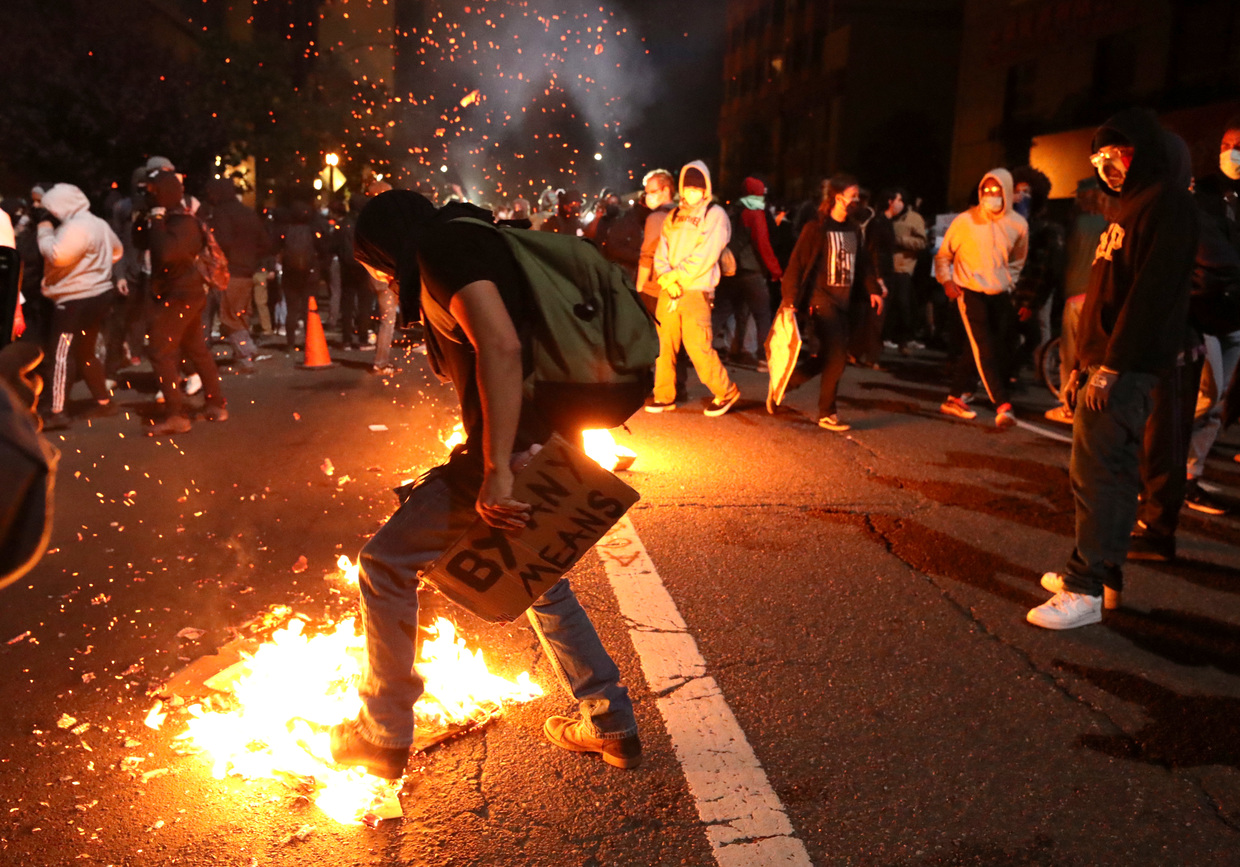
Other judges have enthusiastically gone along with the January 6 crackdown. For instance, Jacob Chansley, the costumed rioter famously known as “QAnon Shaman,” was sentenced in November to 41 months in prison, despite not even being accused of any acts of violence. Prosecutors called for a tough sentence against Chansley to “set an example” and deter any future “assault on our democracy.”
No such example was needed, apparently, in the prosecution of Joshua Warner, a transgender Antifa activist also known as Eva Warner. The DOJ last month dropped charges against Warner after the defendant completed 30 hours of community service. Warner, who was arrested for allegedly assaulting officers at a Portland riot in August 2020, also was busted for alleged offenses at multiple other riots and let go without being charged.
Portland was plagued by rioting for more than 100 straight days in 2020, when Antifa activists laid siege to the Mark O. Hatfield federal courthouse. Officers were assaulted with hammers, slingshots and other weapons. Warner’s alleged tool of choice was a powerful laser that can cause permanent damage when shined into someone’s eyes.
But politicians and media outlets reacted to the violence in Portland by expressing outrage over the tactics of federal law enforcement under the Trump administration. Mayor Ted Wheeler demanded that federal officers “stay inside their building or leave Portland altogether.” The city of Portland fined the Trump administration $11 million for blocking a bike lane when it erected a fence around the embattled courthouse.
The New Republic characterized efforts to quell the riots as “a historic federal crackdown on dissent.” Ironically, CNN opined that by calling protesters who disagree with him “terrorists, ”Trump had put himself “in the company of the world’s autocrats.” Never mind that the protesters were committing assault, arson and other acts of violence in pursuit of their political cause. Under Trump’s watch, calling violent rioters domestic terrorists was autocratic.
Just as the political violence in Portland was downplayed and largely forgiven, an Antifa activist who bashed the office entrance of US Senator John Hoeven (R-North Dakota) with an axe in December 2020 was spared incarceration. Alexander Starks was sentenced to probation, rather than the 10-16 months imprisonment that he could have gotten, and reportedly gushed on Facebook that the DOJ was kind enough to return his axe. Law professor Jonathan Turley decried the move, saying the axe was returned “as if it was a form of political expression.”
While the DOJ is cracking down on the Capitol trespassers, the Democrat-controlled House of Representatives has formed a committee to undertake a “9/11-style” probe of the riot’s origins. The apparent idea is to show how Trump and his allies incited the “insurrection,” just as Democrats claimed when the House voted to impeach the former president last January.
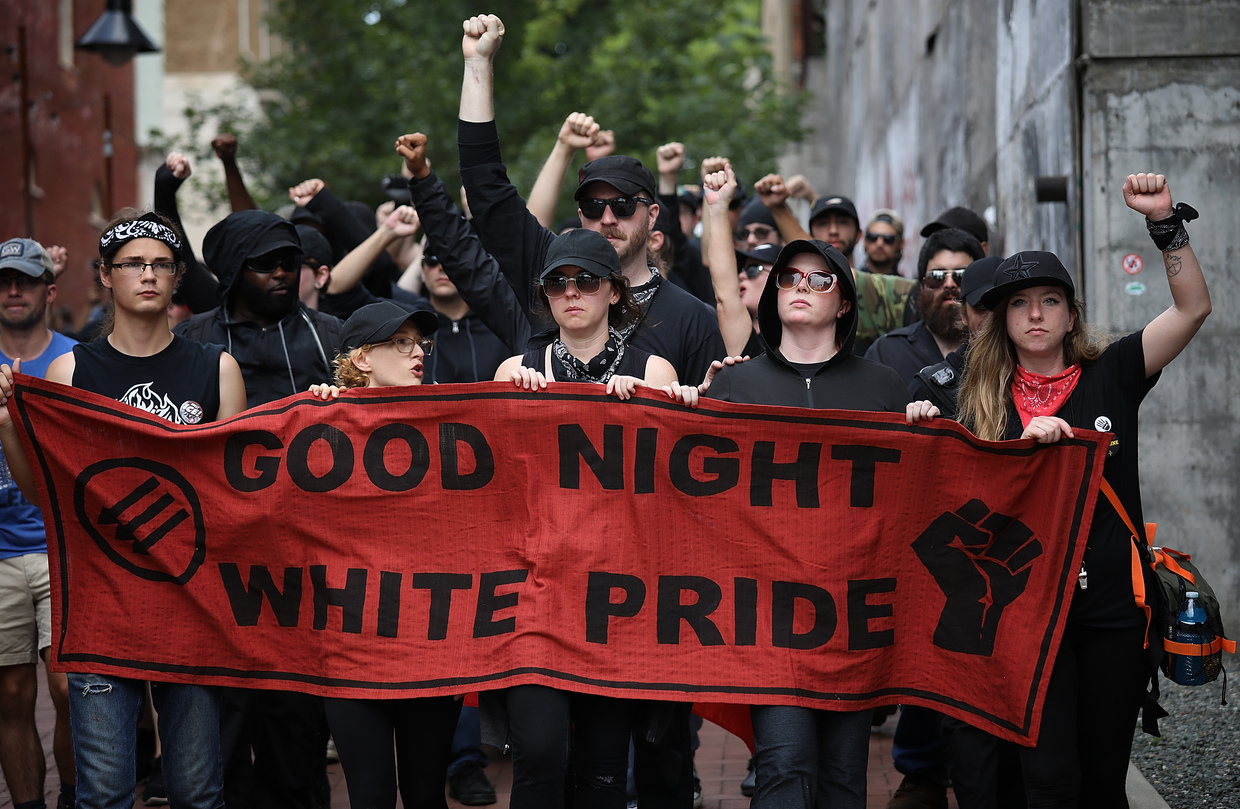
The panel has tried to play hardball with Trump allies who have declined to testify in the investigation. Last month, it voted to hold former White House chief of staff Mark Meadows in contempt of Congress, calling for him to be prosecuted by the DOJ for refusing to cooperate. Former Trump advisor Steve Bannon was indicted by the DOJ in November on the same grounds.
The House committee’s chairman, Representative Bennie Thompson (D-Mississippi), suggested last month that Trump allies who decline to answer his questions by exercising their constitutional right against self-incrimination are essentially admitting to illegal activity. In some instances, he added, invoking the 5th Amendment right “says you are part and parcel guilty of what occurred.”
And just as in the case of the QAnon Shaman, Democrats are seeking to make examples of the Republicans who they believe promote domestic terrorism. Representative Cori Bush (D-Missouri) said last week that Congress should commemorate the one-year anniversary of the Capitol riot by expelling those members who helped incite the “violent insurrection.” Presumably, Bush and her colleagues would get to decide which democratically elected representatives are guilty of incitement – and therefore fair game to be thrown out of office.
While vilifying the Trump supporters who breached the Capitol, legacy media outlets have sought to paint other political opposition with the same brush. For example, the media reaction was intense when an Oregon man, Jared Schmeck, trolled Biden by saying “Let’s Go Brandon” during a “Santa tracker” livestream on Christmas Eve. Ron Brownstein, editor of the Atlantic, told CNN that the stunt was “fundamentally about insurrection.”
Media coverage of the insolent jokester’s use of an anti-Biden slogan was so overheated that some online commentators mocked the press for giving Schmeck more critical and extensive coverage than Darrell Brooks, the Black Lives Matter supporter who allegedly killed six people and injured 62 by ramming his car into a Wisconsin Christmas parade in November.
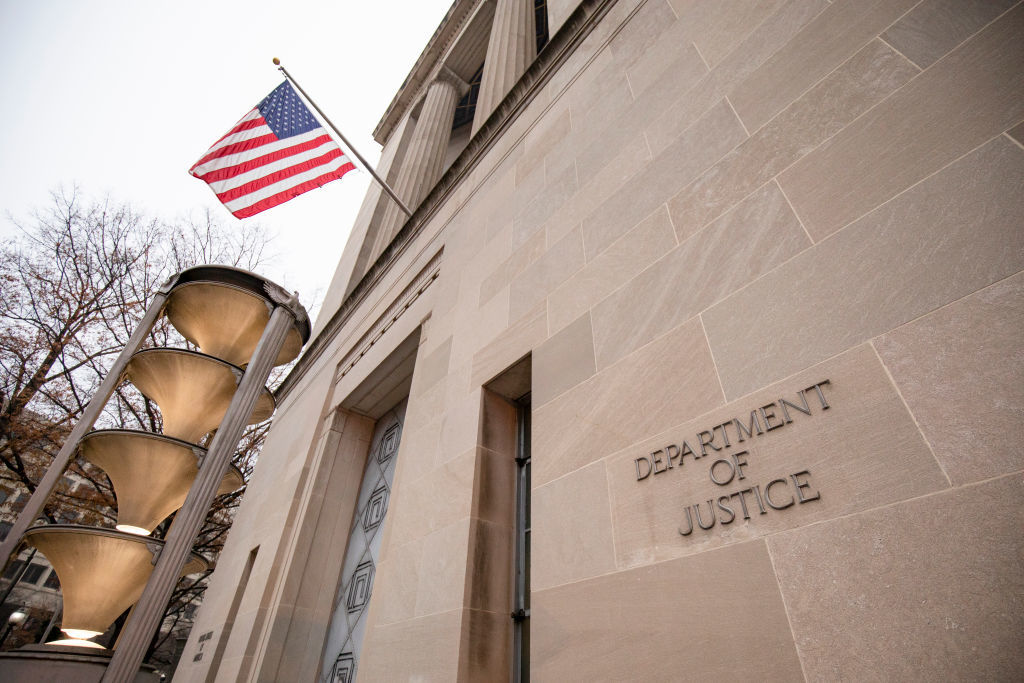
Conservative author Dinesh D’Souza said Schmeck struck a nerve because he used a slogan that mocks both Biden and the media, and he exposed the president’s lack of mental acuity. “Let’s Go Brandon, I agree,” Biden replied on the livestream, apparently missing the fact that he was the butt of Schmeck’s joke.
MSNBC host Nicolle Wallace was among those who blasted Schmeck’s insult against Biden, calling it “slow-motion insurrection.” Her guest, author Jason Johnson, called for a DOJ or CIA investigation and said the “Let’s Go Brandon'' phrase is “the cry of people who want to violently take over this country and oppress anyone who is not like them.”
The statement was one of many examples of mainstream outlets trying to paint anti-Biden Americans as dangerous. When supporters of the riot defendants organized a September rally in Washington, media outlets predicted a possible sequel to January 6. CNN said Capitol Hill was gripped by renewed fears of political violence. NBC News said that as “Trump fans” gathered again in Washington, “the specter of white privilege looms large.”
As it turned out, the approximately 400 attendees were outnumbered by police and reporters. An armed man at the rally was arrested, only to be released after it was revealed that he was a federal officer.
The media’s messaging appears to have done little to change public opinion. A University of Massachusetts Amherst poll released last week showed that 71% of Republicans still believe that Biden stole the 2020 presidential election from Trump. Only 58% of Americans overall said Biden is the rightful president, while 22% of Republicans said the election result was “definitely not legitimate” – results that were almost identical to the responses when the same survey was carried out last April.
The poll showed predictable polarization on the Capitol breach, with 62% of Republicans seeing the participants as “protesters,” rather than rioters, and 68% of Democrat respondents considering them “insurrectionists” and “white nationalists.” A whopping 86% of Democrats support continuing efforts to investigate and prosecute perpetrators of the riot, compared with just 29% of Republicans.
UMass Amherst professors lamented the survey results, saying the poll showed “Republicans and Democrats living in diametrically opposed realities.” They also knew who to blame, citing “persistent and baseless claims by the former president and his sycophants.” Perhaps just like their survey respondents, the pollsters saw reality through the lens of their political ideology. UMass Amherst ranks as one of the most liberal colleges in Massachusetts.
Another poll suggested that Americans are about equally divided on the seriousness of the Capitol riot. A November survey by Iowa’s Des Moines Register revealed that half of respondents believe the breach was an insurrection and a threat to democracy. Republicans and Democrats were polar opposites on the question, while 50% of independents agreed that the riot was a threat to democracy.
Still another poll found that more Americans are worried about US-based extremist groups than overseas terrorist organizations. The August survey, which was done by the Associated Press and the NORC Center for Public Affairs Research, found that 65% of Americans are highly concerned about domestic terrorism, compared to 50% who are troubled by extremist groups based outside the US.
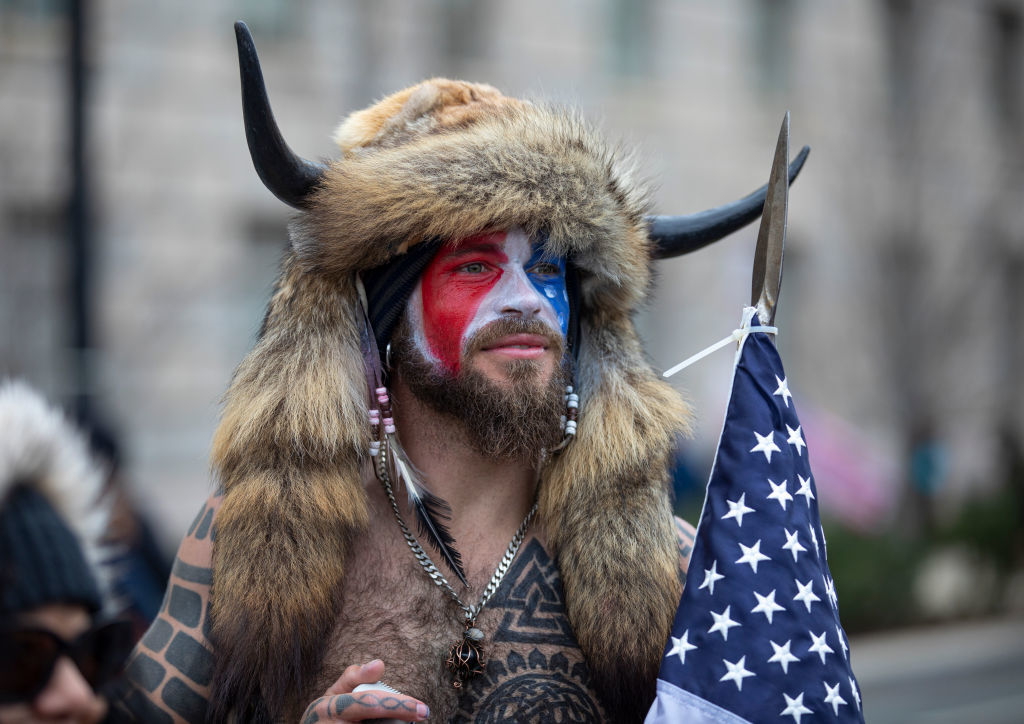
As for the perceived political bent of the domestic extremists who merit concern — whether the chief bogeymen come from the far left or right — likely depends on the eye of the beholder. Increasingly, political views shape opinions of the alleged perpetrators.
Consider the case of Thomas Sibick, a New York man who was charged as a Capitol rioter but later renounced Trump, saying he loathed the former president. After receiving a letter from the defendant about his change of heart, US District Court Judge Amy Berman Jackson ordered that Sibick be released into the custody of his family, saying he had earned “the benefit of the doubt.”
